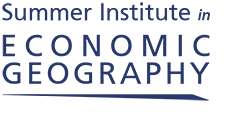“The Summer Institute in Economic Geography is an extraordinary event. It is somewhere in-between a state-of-the-art convention for economic geography (where it stands today and where it needs to evolve) and a rite of passage for early career scholars (once one gains a sense of “location” in something as fluid and difficult to grasp as an epistemic community). Valuable, indispensable, and highly recommended.”
Michiel van Meeteren, doctoral student, Department of Social and Economic Geography, Ghent University, Belgium
